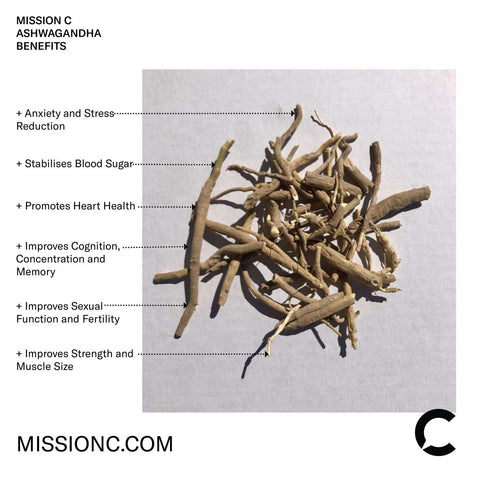Powerful herb ashwagandha is becoming increasingly popular as a rejuvenating tonic for the mind and body. From boosting fertility and decreasing anxiety to improving sleep and cognitive ability, the adaptogen boasts an impressive array of health benefits. In this article, we’ll delve into what ashwagandha is, how it can benefit you, how to use it and how its effects may be enhanced by combining the herb with CBD-infused oil.
What is Ashwagandha?
Ashwagandha is a small evergreen shrub with yellow flowers that is native to Africa and Asia. The herb, also known as Indian ginseng, has been used for thousands of years for medicinal purposes, including stress relief and boosting energy. The name ‘ashwagandha’ comes from the ancient Sanskrit language and means ‘scent of a horse’ – a reference to the scent of the herb and its potential to increase strength.
Ashwagandha is a type of ‘adaptogen’ – a natural, plant-based substance that assists the body in dealing with stress.
What are the Benefits of Ashwagandha?
Ashwagandha offers an array of potential health-boosting benefits.

1. Anxiety and Stress Reduction
Ashwagandha is most commonly used for its stress and anxiety-relieving properties and its ability to promote better sleep. One study highlighted ashwagandha’s potential to significantly reduce levels of stress and anxiety in individuals consuming the herb.
Ashwagandha has been shown to support adrenal glands by regulating levels of cortisol (the stress-related hormone), which reduces negative health effects associated with high or low cortisol levels. By supporting adrenal function, the herb also has an indirect, positive effect on thyroid function by stimulating the activity of the thyroid hormone.
2. Stabilises Blood Sugar
Ashwagandha has been shown to reduce blood sugar and triglycerides (fat) levels in the blood when they are too high or increase them if they are too low. Further studies are required, but ashwagandha’s ability to stabilise blood sugar could mean that the adaptogen may have a significant impact on diseases such as diabetes, dementia and depression.
3. Promotes Heart Health
Consumption of ashwagandha may boost VO2 max levels and improve cardiorespiratory endurance. VO2 max is the maximum volume of oxygen you can take in during physical exertion and is often used as a tool to measure fitness and how well the heart is working to deliver oxygen to muscles during physical activity.
4. Improves Cognition, Concentration and Memory
Some small studies have shown that ashwagandha can significantly improve memory and cognitive function, as well as improve the attention span of some individuals. While further research is required, ashwagandha may improve reaction times and the ability to respond to instructions.
5. Improves Sexual Function and Fertility
Taking ashwagandha may improve sexual function (such as arousal and lubrication) in females and improve sperm quality and fertility in males, by regulating levels of reproductive hormones and boosting testosterone in men.
6. Improves Strength and Muscle Size
Ashwagandha may contribute to enhanced muscle power and size, alongside reducing body fat percentage and cholesterol levels, when consume regularly.
It’s important to note that further scientific research is required to confirm the benefits of consuming ashwagandha. Studies to date show promising results but are largely preclinical and animal-based.
How to Use Ashwagandha
You can take ashwagandha in the morning, during the day or at night. The time of day that you take the adaptogen will likely depend on your wellness goal or the ailment you are trying to treat. For instance, you might take the herb in the evening if used to improve sleep. Ashwagandha can also be taken on an empty stomach in the morning for wakefulness and improved focus.
Ashwagandha is most commonly available as a powder, tea, edibles and capsules.
Top Tip: Your dosage and the best time of day to take ashwagandha is largely dependent on your reason for using it. Start with a small dosage and work your way up slowly if necessary. Always consult a doctor if you are on prescription medication or you are unsure how and when to consume ashwagandha.
Ashwagandha Gummies
Ashwagandha gummies are a tasty, easily digestible and convenient way of reaping the wellness benefits of the adaptogenic herb. Gummies infused with natural, wellbeing-enhancing extracts are rapidly rising in popularity as a way to feel your best throughout the day. Ashwagandha gummies, just like CBD-infused gummies, are available in delicious, fruity flavours to enjoy, and depending on the brand, can be infused with additional vitamins and natural extracts.
Ashwagandha Coffee
Ashwagandha can help wake you up without the subsequent ‘jitters’ associated with your morning cappuccino. However, many people are increasingly opting to take ashwagandha in their coffee, and the adaptogen is now widely available in powders and oils designed to be added to your drink. How do the two stimulants work together?
By adding ashwagandha – which can both calm you and providing clarity of mind and wakefulness – to your coffee, you can experience all the benefits without the jittery experience. You’ll feel sharp, focused and awake, but your cortisol levels are regulated by the adaptogen, keeping you calm and balanced.
Furthermore, ashwagandha can help with the common afternoon slump, boosting concentration and energy levels without the need to rely on caffeine which can make it difficult to switch off at the end of the day.
How Long Does Ashwagandha Take to Work?
It is unlikely that you will feel the benefits of ashwagandha instantly when you first take it. It can take weeks to feel any effects and the time it takes to work may depend on the quality of the herb extract and your lifestyle. One study showed that it took more than 10 weeks for participants to feel the full effects of ashwagandha on sleep quality after taking 300mg of the herb daily.
Ashwagandha Side Effects
Generally speaking, ashwagandha is tolerated well. However, it is important to start with a small dose and work up gradually, as excess ashwagandha may have a negative impact on your blood pressure, thyroid function and kidney function. Other possible side effects include nausea, vomiting or diarrhoea but these are uncommon.
Does Ashwagandha Work Better with CBD?
Ashwagandha may work better when combined with cannabidiol (CBD). CBD is a hemp-derived extract often used to promote relaxation, improve sleep, reduce pain, lower inflammation and minimise the symptoms of stress and anxiety. When combined with ashwagandha, both extracts may work synergistically and the well-being benefits of both are complemented. Some wellness oils, such as Mission C Pre-Workout + CBD Oil, contain an infusion of natural ashwagandha, CBD and additional adaptogens such as maca root, for a significant energy boost and cognitive improvement.
Source: https://www.missionc.com/blogs/news/ashwagandha-everything-you-need-to-know





